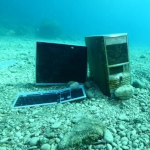And that’s all, I’m happy since I was out of space.
I freed 50gb by running ‘docker system prune’…
last year I had over 1TB freed by docker system prune on a dev VM. If you’re building images often, that’s a mandatory command to run once in a while.
I create a cron job with something like:
docker system prune -af --filter="until=XXh"where XX is on the order of a few days.ah, this filter by timestamp might be very useful to me, thanks
prune as fuck
I once freed 28 GB using
find ~/Downloads/ -mtime +30 -deletepaccache -rgot me about the sameI’m new to docker and all of my shit stopped working recently. Just wouldn’t load. Took about a half hour to find out that old images were taking up about 63GB on my 100GB boot partition, resulting in it being completely full.
I added the command to prune 3 month old images to my update scripts.
Yeah, it’s really not called out in the docs. I found out the same way.
Oh hey thanks for reminding me, freed 5GB which should buy me a bit of time on upgrading the server I use for this lemmy instance.
Oh, that reminds me,…
Clean all the cache downloads of Arch Linux Packages
pacman -Scc
Remove unused docker networks and images
docker system prune --all
Cleanup untracked git files that might be in .gitignore such as build and out directories (beware of losing data, use “n” instead of “f” for a dry run)
git clean -xdf
Do an aggresive pruning of objects in git (MIGHT BE VERY SLOW)
git gc --aggressive --prune=now
Remove old journal logs, keeping last seven days
journalctl --vacuum-time 7days
Remove pip cache
pip cache purge
Remove unused conda packages and caches:
conda clean --all
If you are a Python developer, this can easily be several or tens of GB.
I can see you’re not using Flatpak, the destroyer of disk space. Nice list though!
Uninstall unused flatpak dependencies:
flatpak uninstall --unused
No one showing love for ncdu around here?
Ncdu is my go-to tool. Can’t live without it on the servers I administer. However from this thread I’ve also learned about gdu, diskonaut and du-dust that I need to check out.
Goat
I freed my entire disk by removing the French language pack
I recommend it too. It’s simple as doing:
sudo rm -rf /Where “-rf” obviously stands for “remove french”.
The joke goes
rm -fr, which stands for “remove french”. Yours has double “remove” and is less believable.Ops, you are right. My bad
(This is a joke don’t do this or you’ll ruin your computer)
You can run it without causing any problems if you add the
--no-preserve-rootflag as well of course
It doesn’t mean For Real? Jk
@OrderedChaos ‘real fun’ 😜
Yes, it is.
For the curious, rm -fr /
I’m more of a baobab person myself 😋
Isn’t it the same?
Basically, just using gtk instead of Qt :P
I’ve really enjoyed
ncdu(for those looking for a non-GUI option).
Personally I’m loving diskonaut. “Graphical” representation but at, ahem, terminal velocity.

Jesus, that rustup folder is HUGE
One of the things I dislike about Rust is the massive amount of disk space and time it takes to do a download, compile, test run.
2GB of dependencies and build files for a 200K binary is a bit much.
I use dua, but this looks neat too.
Linky pls
https://github.com/imsnif/diskonaut
No package for my distro, I “installed” an AppImage with AM (which is also how I discovered it)
tyvm
The following NEW packages will be installed: filelight gamin kded5 kio kwayland-data kwayland-integration libdbusmenu-qt5-2 libgamin0 libhfstospell11 libkf5auth-data libkf5authcore5 libkf5codecs-data libkf5codecs5 libkf5completion-data libkf5completion5 libkf5config-bin libkf5config-data libkf5configcore5 libkf5configgui5 libkf5configwidgets-data libkf5configwidgets5 libkf5coreaddons-data libkf5coreaddons5 libkf5crash5 libkf5dbusaddons-bin libkf5dbusaddons-data libkf5dbusaddons5 libkf5doctools5 libkf5globalaccel-bin libkf5globalaccel-data libkf5globalaccel5 libkf5globalaccelprivate5 libkf5guiaddons-bin libkf5guiaddons-data libkf5guiaddons5 libkf5i18n-data libkf5i18n5 libkf5iconthemes-bin libkf5iconthemes-data libkf5iconthemes5 libkf5idletime5 libkf5itemviews-data libkf5itemviews5 libkf5jobwidgets-data libkf5jobwidgets5 libkf5kiocore5 libkf5kiogui5 libkf5kiontlm5 libkf5kiowidgets5 libkf5notifications-data libkf5notifications5 libkf5service-bin libkf5service-data libkf5service5 libkf5solid5 libkf5solid5-data libkf5sonnet5-data libkf5sonnetcore5 libkf5sonnetui5 libkf5textwidgets-data libkf5textwidgets5 libkf5wallet-bin libkf5wallet-data libkf5wallet5 libkf5waylandclient5 libkf5widgetsaddons-data libkf5widgetsaddons5 libkf5windowsystem-data libkf5windowsystem5 libkf5xmlgui-bin libkf5xmlgui-data libkf5xmlgui5 libkwalletbackend5-5 libpolkit-qt5-1-1 libqt5texttospeech5 libqt5waylandclient5 libqt5waylandcompositor5 libvoikko1 qtspeech5-speechd-plugin qtwayland5 sonnet-plugins 0 upgraded, 81 newly installed, 0 to remove and 0 not upgraded.
A bit too much to just install one soft. Hard pass.
That’s very normal if you don’t have any KDE apps. If you were using KDE and installed a GNOME app it’d be similar.
It’s a KDE application, yes.
Looks like the depends list of the average KDE app on a none KDE system.
Lol I had no idea it relied on so much. Its just built into KDE. Really great app overall.
Basically all KDE apps have the same dependency set. So install one and the next ones will only install the app most likely. On KDE itself you’d already have these.
You could try baobab instead.
[moonpie@osiris ~]$ du -h $(which filelight) 316K /usr/bin/filelightK = kilobytes.
[moonpie@osiris ~]$ pacman -Ql filelight | awk '{print $2}' | xargs du | awk '{print $1}' | paste -sd+ | bc 4534774045347740 bytes is 43.247 megabytes. That is to say, the entire install of filelight is only 43 megabytes.
KDE packages have many dependencies, which cause the packages themselves to be extremely tiny. By sharing a ton of code via libraries, they save a lot of space.
It being KDE is even less reason to use it
you do realize this makes everyone immediately discard your opinion, because it’s useless, right?
Removed by mod
My little widget to get the weather, Blazing Fast Uber Duper made in Rust, has like 85 total dependencies from like 3 crates that I need…
My own software is a hard pass for myself…
That’s great!
Another thing that is great, since we are talking about disk space: people, check your Rust repositiry, it might be huge.
I deleted that folder and, in my case, freed 12gb. Not too shabby.
flatpak install flathub org.kde.filelight
On gtk desktops it’s something like Baobab. Too sad that the big guys can’t make lightweight and standalone software.
The always huge and killing my system space:
- pacman cache
- docker bullshit
- flatpaks
- journalctl files!
In case you don’t already know about it, paccache (part of the pacman-contrib package) will let you easily remove old packages from the pacman cache
Looks like the Gnome Disk Usage Analyzer but for KDE.
That’s a weird way to spell Baobab
To be fair Baobab is a weird way to spell Baobab
deleted by creator
dustYes, it’s
duin Rust + more.Came to recommend du-dust!
Isn’t that a wayland notification daemon already?
Edit: no, that’s dunst.
Btw, how do you do the background color thing?
Now someone needs to do a rewrite of dunst in rust called runst to make the confusion complete.
I was confused what you meant by background colour thing so I went to
dustdocs haha.Now I got you. It’s a codeblock so it shows in monospace font. Look up .md formatting for tips.
In this case its a word between backticks `
Ah, right, it’s the
inline code. Mindslip. Thanks!
I have to remember to check this out. its on my reminders in my self host calendar but its been offline fpr quite some time after moving.
My dad’s Linux setup couldn’t log in. After a bit of investigation, starting the session manually and so on, i got a hunch and indeed; i saw in Baobab that the backup script took the wrong disk, filled up the one with home, making it slow, so the log-in thingie timed out, failing the session.
I love Filelight. Whoever came up with it is brilliant.
i use https://dev.yorhel.nl/ncdu for this
Also dust
I’m à qdirstat guy : https://github.com/shundhammer/qdirstat
I believe FileLight (in OP above) is a fork of or built on top of QDirstat.
This is why I’ve set up a ramdisk on
~/.cacheand~/Downloads– “free” automatic cleanup plus a tad more of performance because why not.I might do that just to force myself to organize and move files out of downloads.
I don’t think you’ll need to do that, unless you are planning to download files that are over 4Gb long and/or you are using a potato that has less than 1 Gb of ram.
t. I’ve set my entire ram into a ramdisk, and the performance actually IMPROVED compared to not setting a ramdisk at all.
I don’t think they meant forcing themselves because their RAM would fill up, but because their stuff would be gone after rebooting if they didn’t move it.





























